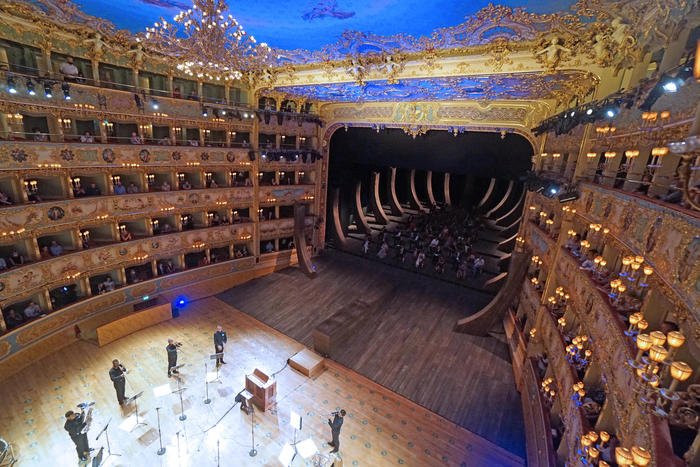(ANSA) - ROME, DEC 30 - No audience, musicians with masks, the orchestra ready to 'invade' the empty stalls and the choir arranged on the stage and in the side boxes: the Fenice of Venice reinvents itself in compliance with the anti Covid rules and does not give up at the traditional appointment with the New Year's Concert, directed for the third time by Daniel Harding, which RaiCultura will present on Friday 1 January at 12.20 pm live on Rai1, with a repeat at 6.15 pm on Rai5.
"It will be a different concert, due to the absence of the public, the new arrangement, a stage that will expand to the whole theater", explains the superintendent, Fortunato Ortombina, presenting the appointment in live streaming.
"In the hall we have removed the armchairs to accommodate the orchestra: the space will continue towards the stage where we have set up nostrachiglia, the extraordinary installation that reproduces a ship under construction: it marked the reopening of the theater after the first lockdown, today it symbolizes the ark that will have to carry us in a new world, that of recovered normality ".
With the orchestra and solo voices of soprano Rosa Feola and tenor Xabier Anduaga, Harding will propose a selection of great Italian and European operas.
We will go to Mozart with the overture from the Nozze di Figaro to two Verdi pages: the aria 'La donna è mobile' from Rigoletto and the famous chorus 'Chi delgitano i giorni abbella!'
from the Trovatore;
the aria 'Je veuxvivre dans le rêve' from Romeo et Juliette by Charles Gounod will follow.
And still Barcarolle from Jacques Offenbach's Contes d'Hoffmann, the aria 'Ah, mes amis, quel jour de fête!'
from the Fille durégiment by Gaetano Donizetti.
The Intermezzo from the Cavalleriarusticana by Pietro Mascagni will introduce the final part, again entrusted to Verdi: the aria by Violetta 'It's strange! ... It's strange! ... Always free degg'io' from Traviata and the choirs 'Vapensiero sull'ali dorate' from Nabucco and the inevitable toast 'Libiam ne' happy chalices', again from Traviata.
"We did not want to give up these festive aspects - emphasizes Ortombina -: we want to tell the public that we are there, we reach them with this message of culture and beauty, confirming how important music is for the people who listen to them".
(HANDLE).

